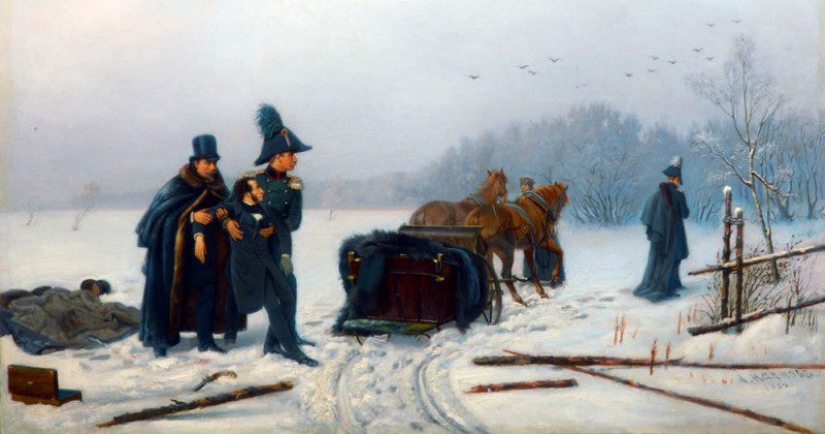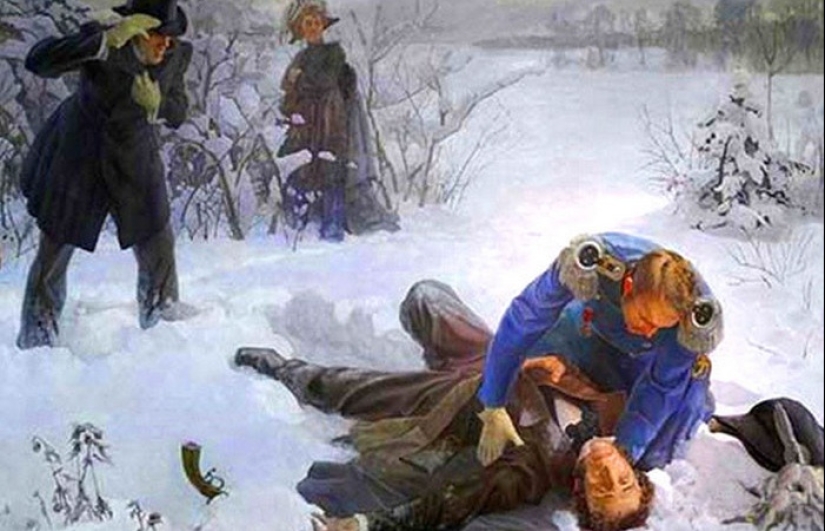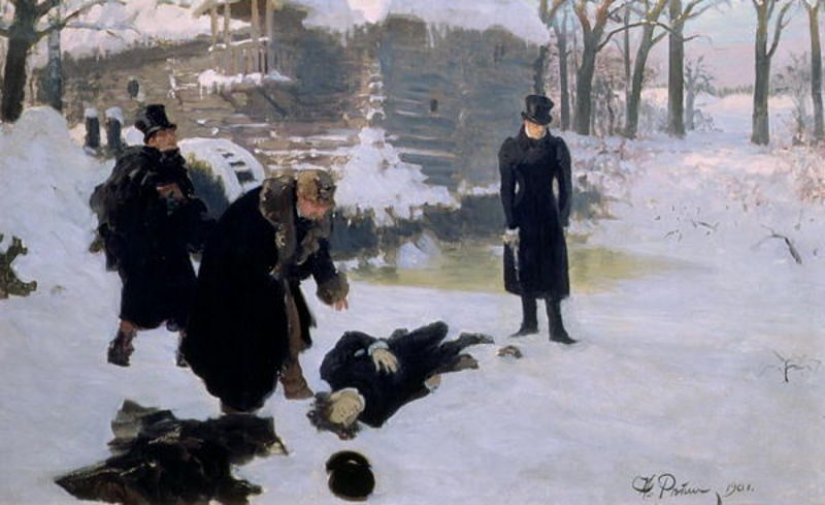Was there a chance to save Pushkin after the duel? Opinion of modern specialists
Categories: Celebrities | Culture | Health and Medicine | History | World
By Pictolic https://pictolic.com/article/was-there-a-chance-to-save-pushkin-after-the-duel-opinion-of-modern-specialists.htmlThe world has lost many great people because of tragic, sometimes ridiculous cases. With the current level of medicine, many people could have been saved, for example, the great Russian poet Pushkin. Many studies and articles have been written on this topic by amateurs and specialists. But did the genius of literature have at least a small chance to recover after being injured at the beginning of the XIX century, if he had received the highest quality medical care at that time?

The death of the great poet A. S. Pushkin occurred on January 29 (February 10), 1837 from peritonitis caused by a bullet wound in the stomach. Alexander Sergeevich was wounded on January 27 during a duel with Georges Dantes, on the Black River. The bullet shattered the poet's femur and hit the abdominal cavity, while he lost a lot of blood. From the place of the duel, Pushkin was transported to his house on the Moika Embankment, where he died.

Could Pushkin's death have been prevented? Today, no one will definitely give an answer to this question. But there is an opinion that the poet died not so much from a serious wound, but from the unskilled actions of people around him, including doctors. What mistakes were made?
Pushkin's second in the duel was his close friend Danzas, who was responsible for organizing the duel. For some reason, neither he nor the other participants in the events on the Black River did not think to invite a doctor with them, which was completely normal at that time.

The lack of qualified assistance in the first minutes after the injury led to a large loss of blood to the wounded, which, of course, played a role in the deterioration of the poet's condition. The dressing done on the spot allowed it would stop the blood and increase the chances of a favorable outcome.
In his book "The Duel and the Death of A. S. Pushkin through the eyes of a modern surgeon", the famous researcher and surgeon, associate professor of the Perm Medical Academy Mikhail Davidov writes the following:
The journey from the Black River, which at the beginning of the XIX century was located outside the city, to the poet's house in the center of St. Petersburg, took a long hour and a half. Another doctor, Sh. I. Uderman, in the book "Selected essays on the history of Russian surgery of the XIX century", said that based on the information left by witnesses, it can be concluded that Pushkin lost at least 2,000 milliliters of blood.
This is about 40% of the blood that is in the human body. Such blood loss, complicated by traumatic transportation, negatively affected the immune system of the wounded, which became one of the causes of sepsis, and an important one.
Most researchers agree that Pushkin had to be transported to the clinic, since his injury was severe. Probably, the poet himself demanded to take him home, but in this state he was hardly able to really assess the situation. The friends present at the duel should have insisted on transporting the wounded man to the nearest hospital, but they did not do this.

Pushkin's house on the Moika, where the last days of his life were spent
Despite the fact that the level of medicine at that time could not be compared with the modern one, urgent hospitalization would have allowed the poet to start providing assistance much earlier and would have increased his chances of recovery.
In the book of Mikhail Davidov, it is said that the first professor of obstetrics, B. V. Scholz, arrived at the bed of the wounded Alexander Sergeevich. This doctor was not called to the patient — he was accidentally met on the street by Danzas, who was sent for medical help.

Scholz, together with Dr. Karl Zadler, was doing a dressing for the poet, and when he finished, he said: "I can't hide that your wound is dangerous." His phrase was almost verbatim confirmed by the family doctor of the Pushkin family, I. T. Spassky, who arrived a little later, and the life physician of Emperor Nicholas I, N. F. Arendt.
Simply put, no one tried to support Pushkin and give him at least some hope for a successful outcome. That is why the poet, instead of fighting for life and health, immediately began to put things in order and prepare for death.
The main appointments to the poet were made by Dr. Arendt and his treatment was exceptionally conservative. Everything prescribed by the life doctor was immediately approved by the doctors present at the patient's bedside-surgeons H. H. Salomon, I. V. Buyalsky and other doctors.
Wilhelm Schaak in his article "The Wound of A. S. Pushkin in modern surgical coverage", published in the "Bulletin of Surgery", a century later, in 1937, writes that the poet was treated with poultices and cold compresses, castor oil, opium and belladonna.

Surgical instruments at the beginning of the XIX century were not so primitive
On January 28, when Pushkin began to have severe pain caused by the development of peritonitis, Arendt prescribed an enema to the wounded man. The liquid injected under pressure through the tube caused compression and irritation of inflamed tissues. At the same time, no one took into account that the wound caused fractures of the iliac and sacral bones and it was contraindicated to increase pressure in the pelvis in this case. When Pushkin got worse, he was prescribed leeches, which increased blood loss.

This is exactly what Pushkin's wound would look like in a picture taken with modern equipment
In one of the issues of the" Moscow Medical Newspaper", published in 1860, one of the doctors who treated Pushkin — V. I. Dahl (the compiler of the very dictionary of Dahl), from memory restored the results of the autopsy of the poet's body:

Surgeon and philologist V. I. Dal
The great-grandson of V. I. Dal, the head of the department of hospital surgery of the Kalinin Medical Institute Lev Zhuravsky, 100 years after Pushkin's death, studied archival documents of the beginning of the XIX century and found that at that time they had already performed operations on the intestines and even the stomach.
Such operations were also carried out in the clinic of the Medical and Surgical Academy, the head of which, Christopher Salomon, was one of the treating doctors of the dying Pushkin. According to one of the popular versions, an unfavorable outcome was desirable for the tsar and his entourage, since it easily saved them from a troublemaker and a freethinker.

Perhaps it was because of this that neither the emperor's life physician Arendt nor the other doctors present at the poet's bedside insisted on performing an operation that could give Alexander Sergeevich a chance, albeit very small. Research on the causes of the death of a Russian poet, despite the fact that a little less than two centuries have passed since its moment, is still a popular topic among scientists and enthusiasts. It is possible that we will learn other details about the last days of the poet's life and his death.
Keywords: Duel | Research | Poet | Pushkin | St. petersburg | Death | Surgery
Post News ArticleRecent articles

It's high time to admit that this whole hipster idea has gone too far. The concept has become so popular that even restaurants have ...

There is a perception that people only use 10% of their brain potential. But the heroes of our review, apparently, found a way to ...
Related articles

Sex — is not only enjoyable, but also a very useful exercise. Orgasm improves the General condition of the organs and ...

It is well known that giving up bad habits, physical activity and good sleep can prolong a person's youth. More recently, another ...

Counting sheep while trying to sleep? A Tik-Tok user shared a much more effective way to quickly go into the arms of Morpheus. The ...

New Year's is a time to surprise and delight loved ones not only with gifts but also with a unique presentation of the holiday ...